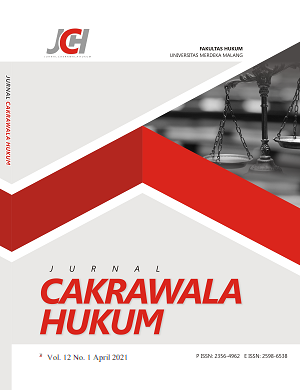Eksistensi peserta pelatihan kerja program pemagangan ilegal luar negeri khususnya di Jepang
DOI:
https://doi.org/10.26905/idjch.v12i2.4830Keywords:
Job Training, Internship, Illegal, Legal Certainty.Abstract
Intern training program outside Indonesia region as a form of manpower development has significant role to overcome the high unemployment rate in Indonesia. In its implementation, the problem occurs wgen the participant of intern training program run away from the program or used to be called as illegal intern trainee. This paper aims to know and understand the existence of illegal intern trainee including the impacts, as well as legal actions that can be taken by Indonesia government to overcome the problems. This study is based on normative juridical approach with primary and secondary data sources. The study shows that the existence of illegal intern trainee that violate Indonesia’s and accepting country’s regulations causes loss of rights of the participant as intern trainee. As a consequence, ocupational safety facilities, and insurance assistance in the case of work accident, illness, nor mortality can not be accomodated, nonetheless assistance can still be given in the context of the illegal intern trainee status as Indonesian citizen. The Ministry of Manpower of the Republic of Indonesia can take preventif actions in the form of supervision and development and represive legal action by temporary revocate the sending organization’s license. In the other hand, the Ministry of Foreign Affairs of the Republic of Indonesia can take represive legal actions in the form of legal assistance, aid, including return assistance.
How to Cite Item: Zulfakanti, B., Karsona, A., & Singadimedja, H. (2021). Eksistensi peserta pelatihan kerja program pemagangan ilegal luar negeri khususnya di Jepang. Jurnal Cakrawala Hukum, 12(2), 139-149. doi:https://doi.org/10.26905/idjch.v12i2.4830
ÂÂ
Downloads
References
Adjie, Habib. 2008. Hukum Notaris Indonesia. Bandung: Refika Aditama.
Adjie, Habib. 2008. Sanksi Perdata dan Administratif Terhadap Notaris Sebagai Pejabat Publik. Bandung: Refika Aditama.
Firmansyah, Y.R., 2017. Kekuatan Hukum Akta Perdamaian yang Dibuat Dihadapan Notaris dan Putusan Akta Perdamaian Pengadilan. Jurnal Cakrawala Hukum, 8(2), pp.220-229.
Hadjon, Philipus M. 1993. Pemerintah Menurut Hukum (Wet-En Rechmatig Bestuur). Ctk. Pertama. Surabaya: Yuridika.
Kitab Undang-Undang Hukum Perdata.
Pratiwi, R.O., 2020. Perlindungan hukum bagi penerima wasiat terhadap notaris yang tidak melaporkan akta wasiat secara elektronik. Jurnal Cakrawala Hukum, 11(3).
Purbacaraka, Purnadi., dkk. 1983. Perundang-Undangan dan Yurisprudensi. Bandung: Citra Aditya Bakti.
Purwaningsih, Endang. 2011, Penegakan Hukum Jabatan Notaris Dalam Pembuatan Perjanjian Berdasarkan Pancasila Dalam Rangka Hukum. Jurnal ADIL, Jurnal Hukum Fakultas Hukum Yarsi. Vol. 2. No. 3 Desember 2011.
Semedi, Bambang. 2013. Penegakan Hukum Yang Menjamin Kepastian Hukum. Jakarta: Artikel Pusdiklat Bea dan Cukai.
Shubhan, M. Hadi. 2008. Hukum Kepailitan. Jakarta: Kencana Prenada Media Group.
Sudarsono. 2007. Kamus Hukum Edisi Baru. ctk. Kelima.
Jakarta: Rineka Cipta.
Sutcipto, H.M.N. Purwo. 1995. Pengertian Pokok Hukum Dagang Indonesia Jilid 1, Pengetahuan Dasar Hukum Dagang. Jakarta: Djambatan.
Sutedi, Adrian. 2009. Hukum Kepailitan. Bogor: Ghalia Indonesia.
Undang-Undang Republik Indonesia Nomor 2 Tahun 2014 Tentang Perubahan Atas Undang-Undang Republik Indonesia Nomor 30 Tahun 2004 Tentang Jabatan Notaris.
Undang-Undang Republik Indonesia Nomor 30 Tahun 2004 tentang Jabatan Notaris.
Undang-Undang Republik Indonesia Nomor 37 Tahun 2004 tentang Kepailitan dan Penundaan Kewajiban Pembayaran Utang.
Wisnuwardhani, D.A., 2017. Implementasi Hak Pekerja Dalam Hal Upah di Kantor Notaris. Jurnal Cakrawala Hukum, 8(1), pp.33-43.
Budiastanti, D.E., Adnyana, G.N., Agustine, A.D. (2020). Aspek yuridis program e-karir dalam perspektif hukum Ketenagakerjaan. Jurnal Cakrawala Hukum. 11(2), 147-156. doi:10.26905/idjch.v11i2. 4397.
Additional Files
Published
How to Cite
Issue
Section
License
Copyright (c) 2021 Jurnal Cakrawala Hukum

This work is licensed under a Creative Commons Attribution-ShareAlike 4.0 International License.
Authors who publish in this journal agree to the following terms:
The copyright of the received article shall be assigned to the journal as the publisher of the journal. The intended copyright includes the right to publish the article in various forms (including reprints). The journal maintains the publishing rights to the published articles. Authors must agree to the copyright transfer agreement by checking the Copyright Notice column at the initial stage when submitting the article.









